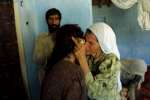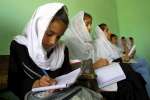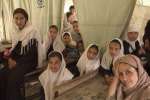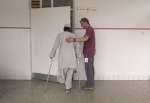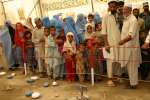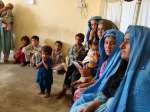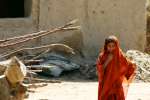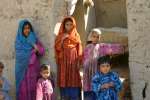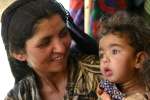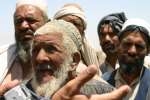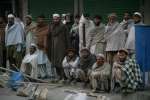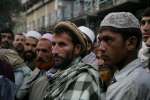Some 3,300 people a day still arriving on Lesvos
News Stories, 13 November 2015
GENEVA, Nov 13 (UNHCR) – With winter closing in, more than 3,000 people a day are still arriving on the Greek island of Lesvos despite dangerous sea conditions and overstretched and inadequate reception facilities, the UN refugee agency said today.
"The number of refugees and migrants arriving on Lesvos continues to be high, at an average of 3,300 people per day so far in November … With winter approaching, reception conditions and capacity there remain overstretched and inadequate," UNHCR spokesperson Adrian Edwards told a press briefing in Geneva.
Of the 660,000 refugees and migrants who have reached Greece this year more than half have landed at Lesvos. So far this year, some 3,460 lives have been lost crossing the Mediterranean, 360 in the last four weeks alone with 250 of these in Greek territorial waters.
"UNHCR is working with the Hellenic Coast Guard to facilitate the deployment of additional experienced life guards and has provided equipment to support the on-going rescue efforts on Lesvos," Edwards added.
UNHCR is also establishing presences at six strategic locations along the island's north shore to provide newly-arriving refugees with immediate life-saving help, working with volunteers and UNHCR's new medical NGO partner WAHA (Women and Health Alliance International), whose capacity is also being enhanced.
"This will be in addition to the existing assembly points where UNHCR and partners already provide places to rest, clothes, food, clean water and medical support. Eight buses and three mini vans are being used to transport new arrivals from the beaches to the reception sites, and this will be expanded as required," Edwards explained.
UNHCR has appealed to the authorities to create additional accommodation and reception capacity as a matter of urgency since there are currently only 2,800 reception places for the 12,000 refugees and migrants currently on the island.
"As a result, many people, including women, children and new-born babies have no choice but to sleep outside, lighting fires to keep themselves warm. This situation creates additional protection and safety concerns and is a cause of tension with the local community," Edwards stressed.
Urgent improvements to facilities for refugees in the island's east at Moria and Kara Tape, under the respective responsibility of the police and the municipality, are also needed. These include lighting, latrines and heating as well as site management.
For the time being, refugees have to find themselves a place to sleep in the few shelters available creating conditions for the "strongest" to find a shelter to the detriment of persons with specific needs. UNHCR, partners and volunteers have to intervene constantly to prevent these situations from happening, but it is critical to designate a site manager with the appropriate authority and resources.
At Kara Tape there have been improvements in living conditions, thanks to the efforts of the municipality, with the support of UNHCR and other humanitarian actors. The improvements include the provision of 172 refugee housing units and 38 tents.
However, conditions at the Moria site remain below minimum standards.
"UNHCR stands ready to assist the authorities to further improve and expand reception capacity," Edwards added, saying that UNHCR staffing was also being boosted.
Thirteen additional staff have been deployed, many speaking the language of the refugees, and bringing the total staff on Lesvos to 30.
"We have brought in more humanitarian aid with 295,000 relief items, including 37,000 blankets to keep people warm, over 45,000 coats to protect people from rain, as well as hygiene and baby care kits, sleeping mats and plastic sheeting. These are being distributed by NGOs and volunteers," Edwards said.
NGOs and volunteers have been playing an essential frontline role on Lesvos and UNHCR is working with the municipality to improve coordination among humanitarian actors as part of its operations on the island.
Proper reception is essential for protecting refugees and migrants, and vital for effective management of the situation. A recent agreement as part of the Leaders' meeting on the Western Balkans route on establishing more reception places in Greece will be a key factor in stabilizing the situation, but fast implementation is needed. UNHCR is working with the EU and Member States to support this initiative.














